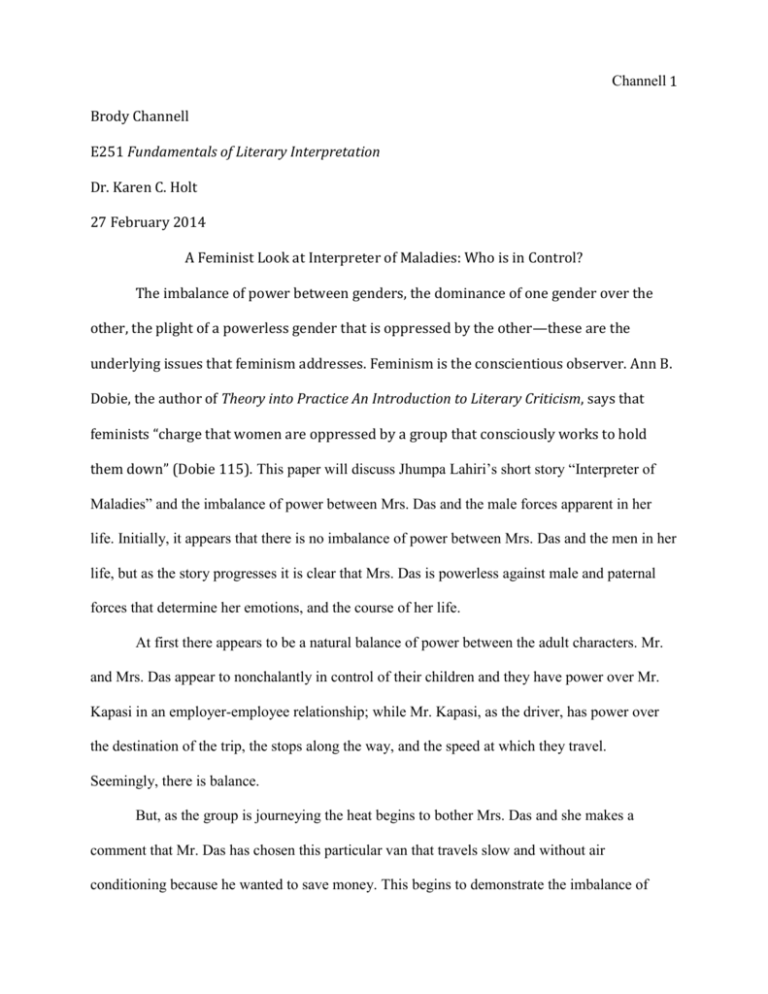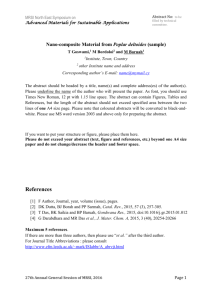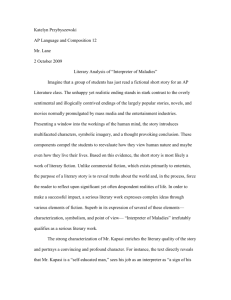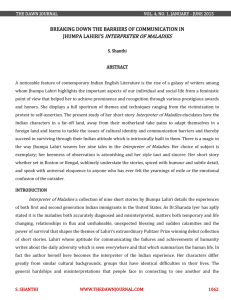
Channell 1
Brody Channell
E251 Fundamentals of Literary Interpretation
Dr. Karen C. Holt
27 February 2014
A Feminist Look at Interpreter of Maladies: Who is in Control?
The imbalance of power between genders, the dominance of one gender over the
other, the plight of a powerless gender that is oppressed by the other—these are the
underlying issues that feminism addresses. Feminism is the conscientious observer. Ann B.
Dobie, the author of Theory into Practice An Introduction to Literary Criticism, says that
feminists “charge that women are oppressed by a group that consciously works to hold
them down” (Dobie 115). This paper will discuss Jhumpa Lahiri’s short story “Interpreter of
Maladies” and the imbalance of power between Mrs. Das and the male forces apparent in her
life. Initially, it appears that there is no imbalance of power between Mrs. Das and the men in her
life, but as the story progresses it is clear that Mrs. Das is powerless against male and paternal
forces that determine her emotions, and the course of her life.
At first there appears to be a natural balance of power between the adult characters. Mr.
and Mrs. Das appear to nonchalantly in control of their children and they have power over Mr.
Kapasi in an employer-employee relationship; while Mr. Kapasi, as the driver, has power over
the destination of the trip, the stops along the way, and the speed at which they travel.
Seemingly, there is balance.
But, as the group is journeying the heat begins to bother Mrs. Das and she makes a
comment that Mr. Das has chosen this particular van that travels slow and without air
conditioning because he wanted to save money. This begins to demonstrate the imbalance of
Channell 2
power between Mrs. and Mr. Das. Since Mr. Das controls the finances, he also controls Mrs.
Das’s level of comfort. Even if she would like to travel under more comfortable circumstances,
her comment makes it clear that she is unable to do so because she is economically powerless
against her husband’s motives and desires for the family’s finances.
During the journey, it initially appears that Mrs. Das controls the power over the sexual
desires of men other than her husband. Her appearance entices the men that sell her the puffed
rice sing her a romantic song, her appearance and accessibility control the lust of Raj’s Punjabi
friend, and her interest in Mr. Kapasi appears to make him recalculate his sense of self-worth.
When Mina remarks that Mr. Kapasi’s second job is “romantic” Mr. Kapasi evaluates his
pathetic life as a failed interpreter in a loveless marriage. He begins to find merit in his job, and
this motivates him to pay special attention to Mrs. Das.
A superficial reading will bring the reader to the conclusion that because Mrs. Das
controls the sexual stage there is a balance between this and the economic factors. A closer
analysis of the psychological impacts on Mrs. Das that the sexual desires of men have reveal that
this is not so. The attentions that the men give to Mrs. Das actually serve as a way to rob the
power that she has over her body, and devalues her personal station from human being to
coveted object. The singing of the men that sell the puffed rice is the first instance. From Smith
College in her article “Jhumpa Lahiri’s Feminist Cosmopolitics and the Transnational Beauty
Assemblage” scholar Vanita Reddy compares this act to song and dance scenes in Bollywood
movies, “The primary function of the song and dance sequence… is to secure a romantic sexual
attraction that, because of Indian state regulations barring sexually explicit expressions of
romantic love… cannot be expressed elsewhere in the film” (Reddy 48). Their song illustrates
that though Mrs. Das purchased the food with rupees, the men received their payment by being
Channell 3
able to stare at her.
Reddy agrees, “As a stylish and beautiful subject, Mina vacillates between being the
object of Mr. Kapasi’s desire and the object of his critique” (Reddy 47). From his vantage-point
as the driver of the van, Mr. Kapasi looks back through the rear-view mirror, sneaking glances at
Mrs. Das’s figure, neck and breasts. The balance of power here has shifted to Mr. Kapasi as he
now has the ability to view her body at his will and dream up his fantasies of a relationship that
he can have with her, built on the commonality of their loveless marriages and, most importantly,
the value that she places in him. When the group has arrived at the Sun Temple, Mr. Kapasi
notices that Mrs. Das is better, more intelligent than the other females that he has taken to this
tourist site because instead of paying attention to the setting, her family, or a useless guidebook,
she pays attention to him. This elevates the status that Mr. Kapasi holds for himself as he now
becomes a figure more important than the Sun Temple or anything else that clamors for attention
in Mrs. Das’s life. In the environment that Mr. Kapasi has created in his mind, she is once again
an object of his lust and self-gratification. When Mrs. Das reveals that the cause for her interest
in Mr. Kapasi is not generated by feelings of love or lust, but by a need for some kind of cure,
the balance of power shifts to Mrs. Das for the first time. Mr. Kapasi is disappointed.
When Mrs. Das recounts the story of her affair with the Punjabi man to Mr. Kapasi, it is
clear again that she is powerless against male dominance. She says that the Punjabi friend of Raj
had just been hired by a pharmaceutical company when he placed his hand on the small of Mrs.
Das’s back. She is powerless against his advance, and “does not resist.” Their sexual encounter is
anything but romantic and gratifying to Mrs. Das. If she initially saw this as a chance to control
the power to feel happy or satisfied, the illusion dissolves as the affair ends after a brief moment
on a couch littered with baby toys and her son crying in his crib. She is left with pain from
Channell 4
having betrayed her husband and a child from this anonymous friend. The Punjabi man gets the
job, a wife, and a family, while Mina Das once again is powerless and unable to feel happy.
At the end of their interview, Mrs. Das pleads with Mr. Kapasi to help her know how to
relieve her pain. Noelle Brada-Williams from San Jose State University in her article about
“Interpreter of Maladies” says that the difference between how Mr. Kapasi and Mrs. Das take
care of their responsibilities, “makes their final disconnect inevitable.” (Brada-Williams 458).
Mr. Kapasi now controls the power over her emotions with the diagnosis that he gives by asking
“Is it really pain you feel, Mrs. Das, or is it guilt” (Lahiri 422)?
From her interactions with the men of the story, the female character Mrs. Das is
displayed as weak and powerless. She can neither use her body to gain influence over the male
characters nor obtain the power of sexual satisfaction. Her body becomes the tool by which she
is robbed of power and valued as an object. To the men in India, she is an object to view, to
admire for physical quality, and to fantasize about. In America, her body is used to make Mr.
Das a family and celebrate the economic success of the Punjabi friend. In the “Interpreter of
Maladies” the lack of power that females have over their happiness and satisfaction is
demonstrated in the life of Mina Das.
Channell 5
Works Cited
Brada-Williams, Noelle. "Reading Jhumpa Lahiri's Interpreter of Maladies as a Short Story
Cycle." MELUS 29.3 (2004): 451-64. ProQuest. Web. 27 Feb. 2014.
Dobie, Ann B. "Feminist Criticism." Theory into Practice an Introduction to Literary Criticism.
Boston, MA: Wadsworth, Cengage Learning, 2012. 102-128. Print.
Lahiri, Jhumpa. "Interpreter of Maladies." Literature a Portable Anthology. Ed. Janet E Gardner,
Beverly Lawn, Jack Ridl, and Peter Schakel. Boston, MA: Bedford/St. Martin's, 2013.
407-424. Print.
Reddy, Vanita. "Jhumpa Lahiri's Feminist Cosmopolitics and the Transnational Beauty
Assemblage." Meridians 11.2 (2011): 29,59,245. ProQuest. Web. 27 Feb. 2014.










